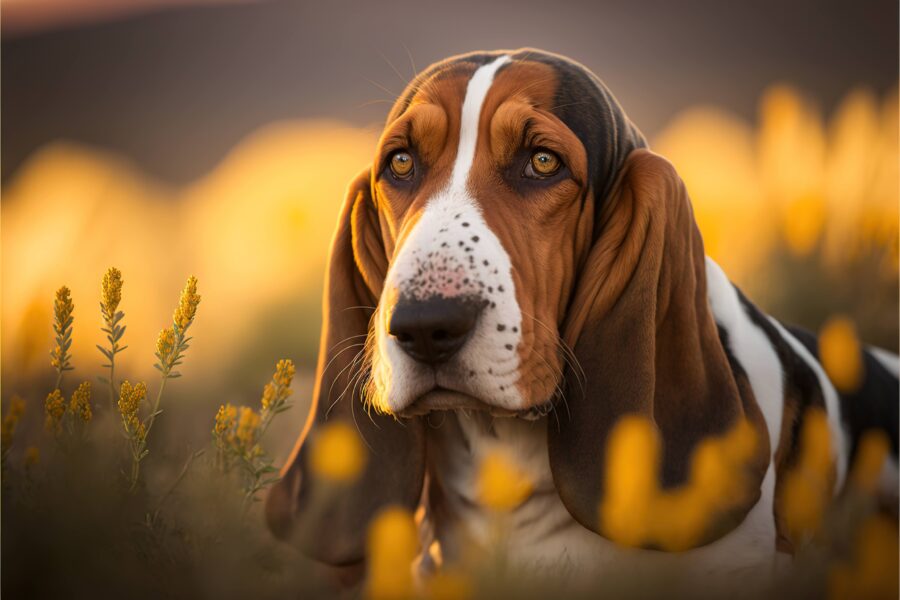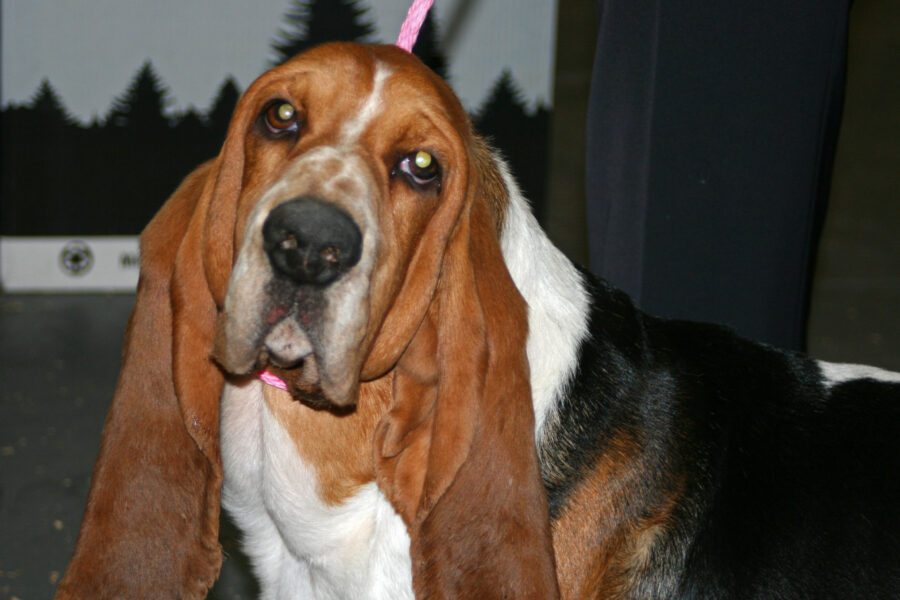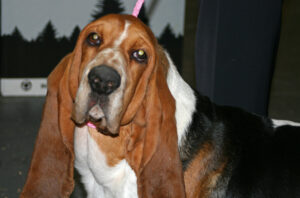Are you a parent of a Basset Hound that likes to bite a lot? Puppy biting is a normal process, and you don’t need to be concerned about it. But, when do basset hound puppies stop biting?
I did some research and talked to our local veterinarian about basset hound biting. So, in this article, I will talk about when basset hound puppies stop biting and how to train your basset hound pup not to bite.
When Do Basset Hound Puppies Stop Biting?
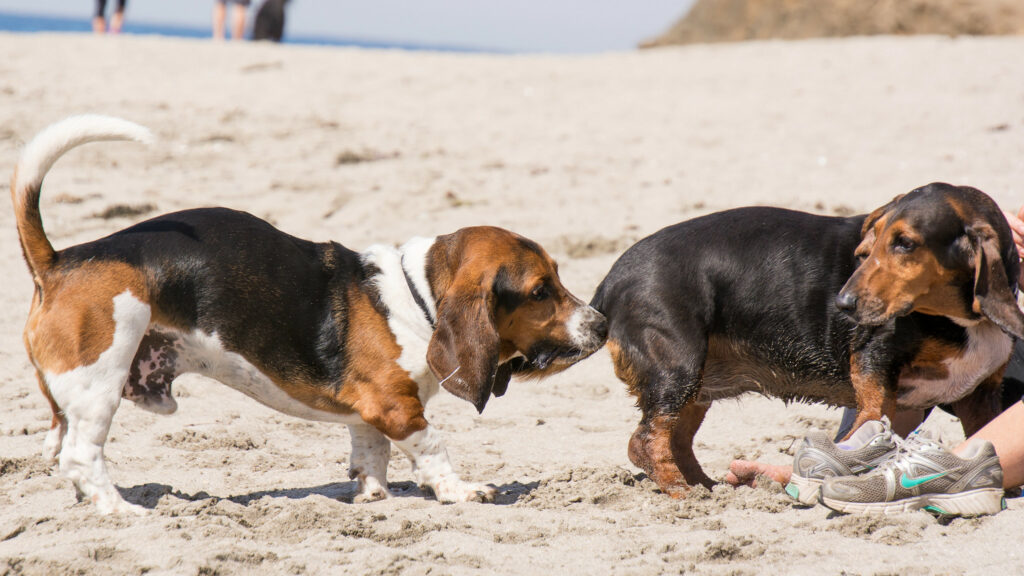
Basset puppies will stop biting when their process of teething is over. This process usually takes 7 to 8 months. Playing biting is also a common cause and will stop when your basset puppy realizes that this is not the right way to interact.
An-8 week old basset hound puppy bite can be pretty surprising, especially when it’s teething. Basset hound puppies start teething at 3-4 months and the process takes up to 7-8 months.
Basset hound puppies usually bite because they are teething, but they can also bite in play. The basset hound puppies’ bite will stop with some exceptions when they get fully grown teeth at 7 or 8 months.
When I adopted my basset hound puppy for the first time at home, and when it started biting me, I was distraught because I didn’t know why and when my basset hound puppy would stop biting.
But after some research, I discovered that it’s nothing that I have to worry about, and this is because its teeth are teething or because it wants to play with me.
However, as I said, biting is an entirely normal process in basset puppies. This is the same as human babies when they bite while their teeth are teething.
Also, when your basset puppy bites, that doesn’t mean that your puppy is aggressive. Your basset puppy is still a puppy and has not learned the proper way to take an interest in others.
How Do I Train My Basset Hound Puppy Not To Bite?
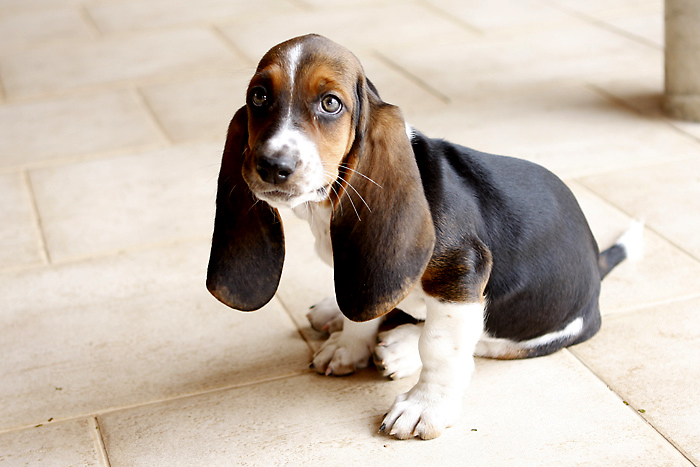
To stop your basset hound puppy from biting, you need to find out the cause behind it and then conduct proper training.
Your basset hound puppy needs to learn that biting is not the correct way to interact. It’s, therefore, necessary to teach your basset hound puppy at an early age to socialize with humans.
Basset puppies have their reasons for biting. It can be either the learned or instinctive behavior of your basset puppy. Basset hounds are very affectionate and loyal dogs. So with patience and, above all, proper training, you can teach your bass puppy to stop biting.
Here are some effective steps you can take to begin the process of preparation for training
1. Teach your puppy bite inhibition
The first step of training my basset hound puppy not to bite is to inhibit the behavior. It is usual for basset puppies to mouth each other when they play. This mounting sometimes can quickly turn into a bite.
When it does, the basset puppy on the receiving end will yelp, and this sound makes your basset puppy do the biting, thus making him release.
Also, basset hound owners can exploit this behavior to stop basset puppy biting and teach a pup how much puppy mouthing is acceptable.
When your basset puppy latches on your hand or finger too hard, let your hand go limp and imitate that yelping sound. But when your basset puppy releases, ignore them for 10 to 20 seconds and then resume play.
Every basset owner needs to remember never to pull away from the bite. This can trigger your basset puppy’s chase instinct and make the problem get worse.
Never repeat the limp and yelp process more than three times in 15 minutes. If you come to this point, then it’s time for a basset puppy timeout.
The goal in all this is to teach your basset puppy that soft play continues and rough latitude must-stops. Once you have inhibited the hard bites, repeat this teaching process with more moderate bites.
Even if you should be able to teach your puppy that mouthing without biting down is ok, anything more than that is not.
2. Redirect the behavior
If you like to teach your basset puppy that its mouth on human skin is not acceptable at all, you will most likely need to use the redirection method.
Each time your basset puppy tries to bite you, pull your hand away before contact and promptly provide a treat or wave around a chewy toy for it to bite on instead.
You can also satisfy your basset puppy’s urge to bite things with noncontact games such as fetch or tug of war. Always keep in mind to never let the tugging become too aggressive.
You will need to teach your basset puppy the commands “let go” or “leave it,” In that way, you can permanently remove something from its mouth without the response of aggressive basset puppy biting.
3. Use the teething toys
Distracting with and redirecting your basset puppy’s biting to safe and durable chew toys is one good way to keep them from focusing their mouthy energies on an approved location and teach them what biting habits are acceptable.
4. Make sure your basset puppy is getting the proper amount of exercise
There is a different exercise that you can provide to your basset puppy. So first, check with your veterinarian to make sure that your puppy is getting the activities it needs. Basset puppies use their playtime to get out extra energy.
However, with too much pent-up energy, your basset pup may resort to playing biting. Therefore, it is necessary to expel their energy positively, including physical and mental exercise. This will help mitigate extra nips.
5. Being consistent
Training your basset pup requires a lot of patience, practice, and consistency. With the proper training techniques and commitment, your basset pup will learn what is preferred behavior. Although sometimes it can be easier to let a little nipping activity go, always remain consistent in your cues and redirection. In that way, boundaries will be clear for your pup.
6. Use positive reinforcement
If you want to establish preferred behaviors, use positive reinforcement when your basset pup exhibits the correct behavior. For example, praise and treat your basset puppy when they listen to your cue to stop unwanted biting as well as when they choose an appropriate teething toy on their own.
7. Say “Ouch”
Whenever your basset puppy becomes too exuberant and nips you, say “Ouch” with a very shocked tone and immediately stop playing with them. Your basset puppy must learn that their form of play has become unwanted. When they stop biting, make sure that you follow up with positive reinforcement by offering praise, treating, and resuming play.
When Do I Know If My Basset Hound Has a Biting Problem
If your Basset Hound pup didn’t stop biting when it was ten months of age, it doesn’t mean that they have a biting problem. Not all puppies develop simultaneously so some puppies might develop in this area sooner than ten months, and some of them will develop later.
Each basset pup is unique and will develop according to its unique nature. The ten-month frame is just that, a time frame and guide. But it doesn’t mean that all basset pups will fit in that category.
Suppose that your basset puppy grows into adulthood and continues to struggle with biting or nipping issues despite reminders and all training, whether it was formal or from their parent. In that case, it will be helpful the most if you consult with a professional trainer or veterinarian.
Also, sometimes your basset puppy can struggle with issues related to nipping and biting due to their instincts or something else like emotions and guarding or territorial traits.
How Can I Give My Teething Basset Hound Relief?
There are many ways to comfort your basset puppy when they are biting or nipping. While they are teething, there are different chew toys that can give them comfort or distractions, or you can provide them with something simple like ice cubes to chew.
In some cases, depending on your basset puppy, it can be very comforting to rub the cloth on their gums if they will allow the pup parent to do so without nipping or biting.
Also, another great way to provide your basset pup relief from teething and stop biting related to this is to provide a distraction.
Distractions like playtime, a walk, some outdoor fun, or something else that will not physically remove their pain and suffering but it temporarily makes them forget about it.
Coincidently if you make a quick change in activities will have the basset pup; it will forget all about what it was doing, biting or nipping. This is also another great way to stop biting or nipping.
When your basset puppy will be done with playtime, the walk, or whatever was new, then they may come back to their chew or teething toy and have a blast relieving their pain and discomfort while being more tired mentally and physically.
A tired basset pup is also less likely to bite as it will likely curl up in a comfortable spot and take a nap, relieving its pain and discomfort.
What Else May Be Causing My Basset Hound To Bit or Nip?
Other things that can cause your basset puppy to bite or nip include emotions like fear. Basset puppies that are afraid, scared, or suffering from other emotional or behavioral issues due to stress can end up biting or nipping accidentally.
Addressing their emotional issues and adjusting their home life and environment can help you to reduce any stress they have and reduce biting or nipping.
Providing them with a loving home that is harmonious and positive for basset hounds to live in can very quickly reduce behavioral issues or emotional problems that can cause biting or nipping.
Because this is considered healthy for them on all levels, physically and mentally, it is essential regardless of whether they are biting.
Should you punish your dog for biting?
You shouldn’t punish a young puppy for biting. Instead, you can and should train your puppy not to bite. Working with your dog while it’s still young can prevent them from biting when they are fully grown.
Sometimes people feel so guilty about their dogs biting someone else that they never want them around children or other dogs again, increasing isolation and loneliness for both human and canine partners. Some people go so far as to have their animal euthanized, sometimes with the intention of getting another dog later. All too often, people are so afraid of being bitten by their own dogs that they become even more aggressive in disciplining them.
The trauma left by a dog bite is always shocking. Bites that break the skin are one thing, but bites that injure muscles and tear flesh can take months to heal–if they ever do.
The physical scarring remains long after the emotional scars fade, if ever. It takes months for the physical wounds to completely heal–and even then there may be deep depressions where chunks of flesh were actually torn away.


